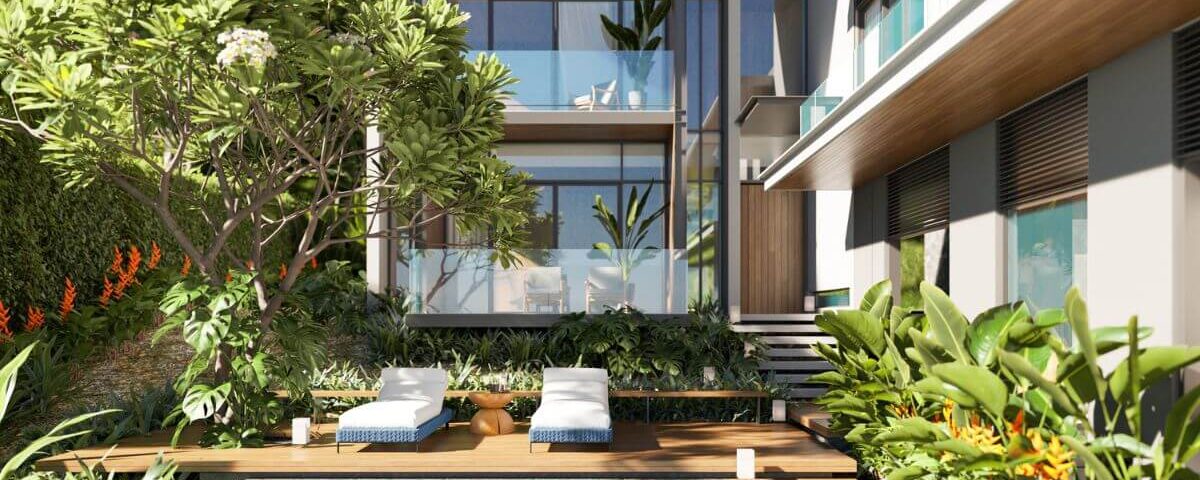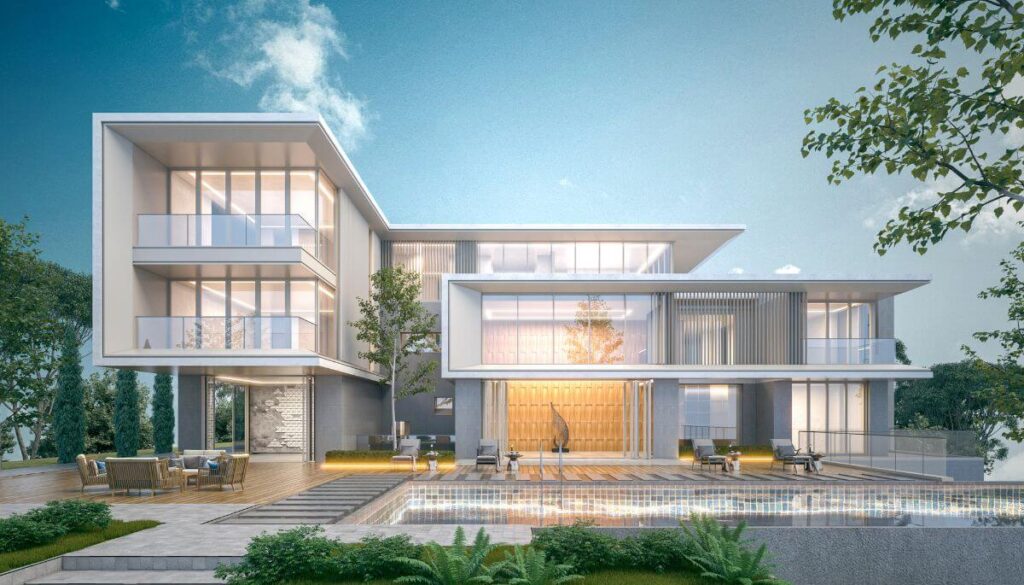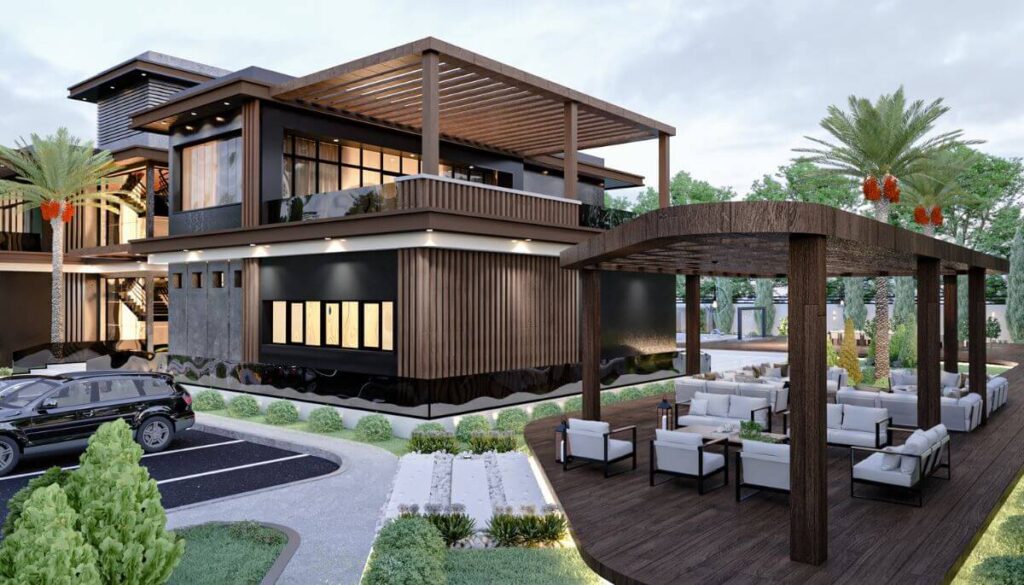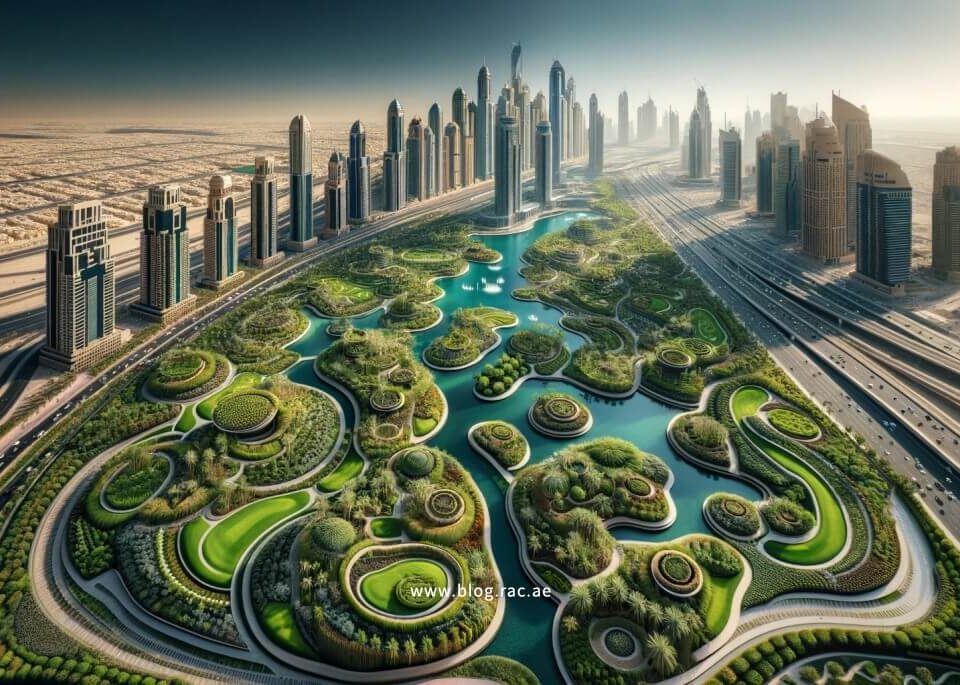
Interior Fit-Out: Transforming Spaces with Precision
May 22, 2024
Luxury Interior Design Services: Creating Opulent Spaces
May 23, 2024Landscaping: Transforming Your Outdoor Spaces

Landscaping is a transformative process that turns ordinary outdoor spaces into beautiful and functional environments. Whether you are enhancing your home garden or upgrading a commercial property, landscaping plays a crucial role in creating appealing and sustainable outdoor areas. In this comprehensive guide, we will explore various aspects of landscaping, including key elements, types of projects, and the latest trends.
Table of Contents
Understanding Landscaping
Definition and Scope of Landscaping
Landscaping encompasses a wide range of activities aimed at improving the aesthetics and functionality of outdoor spaces. It involves the careful planning, design, and maintenance of gardens, yards, and public areas. Landscaping combines both garden design and landscape architecture to create cohesive and beautiful environments.
Differences Between Garden Design and Landscape Architecture
While garden design focuses primarily on the aesthetic arrangement of plants and flowers, landscape architecture encompasses a broader scope, including the integration of hardscaping, water features, and outdoor living spaces. Landscape architects often work on larger projects, such as parks and urban developments, ensuring that the design is both functional and visually appealing.
Importance of Landscape Maintenance and Lawn Care
Maintaining a landscaped area is essential to preserve its beauty and functionality. Regular landscape maintenance, including lawn care, pruning, and fertilization, ensures that plants remain healthy and vibrant. Lawn care, in particular, is vital for keeping grass areas lush and green, enhancing the overall appearance of your outdoor space.

Types of Landscaping Projects
Residential Landscaping
Residential landscaping involves designing and maintaining home gardens and yards. This type of landscaping focuses on creating a comfortable and aesthetically pleasing environment for homeowners. Key elements include flower beds, lawn areas, patios, and garden paths. Residential landscaping can also incorporate features like vegetable gardens and outdoor entertainment areas.
Commercial Landscaping
Commercial landscaping aims to enhance the exterior of business premises, making them more attractive to customers and employees. This includes the design and maintenance of lawns, planting beds, and hardscaping elements like walkways and seating areas. Effective commercial landscaping can significantly improve the curb appeal and functionality of a business property.
Sustainable Landscaping
Sustainable landscaping practices focus on creating eco-friendly and low-maintenance outdoor spaces. This includes using native plants, implementing xeriscaping techniques, and installing energy-efficient landscape lighting. Sustainable landscaping not only benefits the environment but also reduces long-term maintenance costs.
Urban Landscaping
Urban landscaping adapts design principles to suit city environments. This involves creating green spaces within urban areas, such as rooftop gardens, vertical gardens, and public parks. Urban landscaping helps improve air quality, reduce heat islands, and provide recreational areas for city dwellers.

Key Elements of Landscaping
Hardscaping: Incorporating Paths, Patios, and Other Structures
Hardscaping refers to the non-plant elements of a landscape, such as paths, patios, retaining walls, and water features. These structures provide functionality and define different areas within the landscape. Well-designed hardscaping enhances the usability and aesthetic appeal of outdoor spaces.
Landscape Lighting: Enhancing Safety and Aesthetics
Landscape lighting is crucial for extending the usability of outdoor spaces into the evening hours. It also enhances safety by illuminating pathways and entrances. Additionally, strategic lighting can highlight architectural features and create a dramatic visual effect, adding depth and interest to the landscape.
Water Features: Adding Ponds, Fountains, and Waterfalls
Water features like ponds, fountains, and waterfalls add a soothing and dynamic element to any landscape. They can serve as focal points and attract wildlife, creating a more vibrant and interactive environment. Properly designed water features also enhance the overall aesthetic appeal of the landscape.
Native Plants: Benefits and Considerations
Using native plants in landscaping offers numerous benefits, including reduced maintenance, increased biodiversity, and improved resilience to local climate conditions. Native plants are well-adapted to the local environment, requiring less water and fewer chemical inputs, making them a sustainable choice for any landscape.
Design and Implementation
Landscape Design Ideas: Creative Concepts for Every Space
Creative landscape design ideas can transform any outdoor space, whether it’s a small backyard or a large commercial property. Consider incorporating elements like themed gardens, multifunctional spaces, and seasonal plantings to add interest and variety to your landscape.
Patio Design: Creating Functional and Stylish Outdoor Living Spaces
Patios are a popular feature in residential landscaping, providing a space for outdoor dining, relaxation, and entertainment. A well-designed patio should be both functional and stylish, using durable materials and comfortable furnishings to create an inviting outdoor living area.
Seasonal Landscaping: Adapting Your Garden for Different Seasons
Seasonal landscaping involves selecting plants and design elements that provide year-round interest. This includes choosing plants with different blooming periods, incorporating seasonal decorations, and making adjustments to maintenance routines to keep the landscape looking its best throughout the year.
Landscape Renovation: Updating and Improving Existing Landscapes
Landscape renovation focuses on updating and improving existing landscapes to enhance their functionality and aesthetic appeal. This can involve redesigning planting beds, adding new features, or making structural changes to better suit the current needs of the space.
Working with Professionals
Role of Landscape Contractors and Architects
Landscape contractors and architects play a vital role in the success of landscaping projects. Contractors handle the implementation of design plans, including planting, hardscaping, and installing irrigation systems. Landscape architects bring expertise in design and planning, ensuring that the project meets both aesthetic and functional goals.
Choosing the Right Landscaping Services
Selecting the right landscaping services involves considering factors such as the company’s experience, portfolio, and customer reviews. Look for professionals who specialize in the type of project you have in mind and who can provide comprehensive services, from design to maintenance.
Importance of Ongoing Landscape Maintenance
Ongoing landscape maintenance is essential to preserve the beauty and health of your outdoor space. Regular maintenance tasks include mowing, pruning, weeding, and fertilizing. Hiring a professional maintenance service can ensure that your landscape remains in top condition year-round.
Landscaping Trends
Latest Trends in Landscaping and Garden Design
Staying updated with the latest landscaping trends can inspire new ideas and keep your outdoor space looking modern and stylish. Current trends include sustainable landscaping practices, the use of smart irrigation systems, and the incorporation of outdoor living features like fire pits and kitchens.
Innovations in Sustainable Landscaping
Sustainable landscaping continues to evolve, with new innovations aimed at reducing environmental impact. These include the use of recycled materials, rainwater harvesting systems, and the integration of green roofs and walls. Embracing these practices can make your landscape more eco-friendly and efficient.
Popular Materials and Design Elements in Current Landscape Architecture
Modern landscape architecture often features materials like natural stone, composite decking, and metal accents. These materials offer durability and aesthetic appeal, complementing a variety of design styles. Incorporating contemporary design elements, such as clean lines and minimalist features, can create a sleek and modern look.
Key Takeaways: Essential Tips for Successful Landscaping
Recap of Main Points
Landscaping is a comprehensive process that involves the design, implementation, and maintenance of outdoor spaces. Understanding the key elements and types of landscaping projects can help you create a beautiful and functional environment.
Practical Advice for Homeowners and Businesses
For a successful landscaping project, start with thorough planning and design. Consider hiring professionals to ensure high-quality results. Incorporate sustainable practices and stay updated with the latest trends to keep your landscape looking fresh and modern.
Importance of Planning and Professional Guidance
Proper planning and professional guidance are crucial for achieving a successful landscaping project. Work with experienced contractors and landscape architects to develop a design that meets your needs and budget. Regular maintenance is essential to keep your landscape healthy and attractive.
Conclusion
Landscaping is a dynamic field that combines creativity, technical expertise, and a deep appreciation for nature. By understanding the various aspects of landscaping and working with skilled professionals, you can transform any outdoor space into a beautiful and functional environment. Whether you’re designing a home garden or enhancing a commercial property, the possibilities in landscaping are endless.
Explore more about landscaping and discover top service providers. Check out our related articles on Landscaping Design Elements and High-End Landscaping in Dubai. For professional landscaping services, visit RAC Landscaping Services.
FAQs
1. What is landscaping and why is it important?
Landscaping is the process of designing, arranging, and maintaining outdoor spaces to enhance their beauty and functionality. It is important because it improves the aesthetic appeal of an area, increases property value, and creates enjoyable outdoor environments for various activities.
2. How does landscaping differ from garden design?
Landscaping encompasses a broader scope, including the integration of plants, hardscaping elements, and outdoor structures, whereas garden design focuses specifically on the aesthetic arrangement of plants and flowers. Landscaping often involves more complex planning and construction compared to garden design.
3. What are the benefits of landscape maintenance and lawn care?
Regular landscape maintenance and lawn care are essential to keep outdoor spaces healthy and attractive. Benefits include a well-manicured appearance, healthier plants, reduced pest problems, and enhanced curb appeal. Consistent care also ensures that the landscape remains functional and safe.
4. What are the key elements of a successful residential landscaping project?
A successful residential landscaping project includes a well-thought-out design that incorporates elements like flower beds, lawn areas, patios, and garden paths. It should reflect the homeowner’s personal style and needs, and provide a comfortable and aesthetically pleasing outdoor environment.
5. How can commercial landscaping improve business premises?
Commercial landscaping can significantly enhance the exterior of business premises by creating an inviting and professional appearance. It can attract more customers, improve employee morale, and convey a positive brand image. Key elements include well-maintained lawns, attractive planting beds, and functional hardscaping features.
6. What is sustainable landscaping and why is it important?
Sustainable landscaping focuses on creating eco-friendly and low-maintenance outdoor spaces. It involves using native plants, implementing xeriscaping techniques, and installing energy-efficient landscape lighting. Sustainable landscaping is important because it conserves resources, reduces environmental impact, and can lower long-term maintenance costs.
7. How does urban landscaping differ from other types of landscaping?
Urban landscaping adapts design principles to suit city environments. This includes creating green spaces within urban areas, such as rooftop gardens, vertical gardens, and public parks. Urban landscaping helps improve air quality, reduce heat islands, and provide recreational areas for city dwellers, making it distinct from other types of landscaping.
8. What is hardscaping and what role does it play in landscaping?
Hardscaping refers to the non-plant elements of a landscape, such as paths, patios, retaining walls, and water features. It provides structure and functionality to outdoor spaces, defining different areas and enhancing usability. Well-designed hardscaping complements the natural elements and adds to the overall aesthetic appeal.
9. How can landscape lighting enhance an outdoor space?
Landscape lighting extends the usability of outdoor spaces into the evening hours and enhances safety by illuminating pathways and entrances. It also highlights architectural features and creates a dramatic visual effect, adding depth and interest to the landscape. Properly placed lighting can transform the ambiance of an outdoor area.
10. What are the benefits of incorporating water features into a landscape?
Water features, such as ponds, fountains, and waterfalls, add a soothing and dynamic element to any landscape. They can serve as focal points, attract wildlife, and create a more vibrant environment. Water features also enhance the overall aesthetic appeal and provide a relaxing atmosphere.
11. Why are native plants recommended for landscaping projects?
Native plants are recommended because they are well-adapted to the local environment, requiring less water and fewer chemical inputs. They promote biodiversity, support local wildlife, and are typically more resilient to pests and diseases. Using native plants is a sustainable choice that benefits both the environment and the landscape.
12. How can seasonal landscaping keep your garden looking its best year-round?
Seasonal landscaping involves selecting plants and design elements that provide year-round interest. This includes choosing plants with different blooming periods, incorporating seasonal decorations, and adjusting maintenance routines to suit different seasons. It ensures that the garden remains vibrant and attractive throughout the year.
13. What should I consider when renovating an existing landscape?
When renovating an existing landscape, consider the current layout, the health of existing plants, and the overall functionality of the space. Identify areas that need improvement or updating, and plan for new elements that will enhance the design. Working with a professional can help ensure that the renovation meets your goals and adds value to the property.
14. How do I choose the right landscape contractor or architect?
Choosing the right landscape contractor or architect involves considering their experience, portfolio, and customer reviews. Look for professionals who specialize in the type of project you have in mind and who can provide comprehensive services from design to maintenance. A good contractor or architect will listen to your needs and bring creative and practical solutions to your project.
15. What are the latest trends in landscaping?
The latest trends in landscaping include sustainable practices, the use of smart irrigation systems, and the incorporation of outdoor living features like fire pits and kitchens. Innovations such as green roofs, vertical gardens, and the use of recycled materials are also gaining popularity. Staying updated with these trends can inspire new ideas and keep your outdoor space looking modern and stylish.


0 Comments
Its superb as your other articles : D, appreciate it for posting. “Even Albert Einstein reportedly needed help on his 1040 form.” by Ronald Reagan.